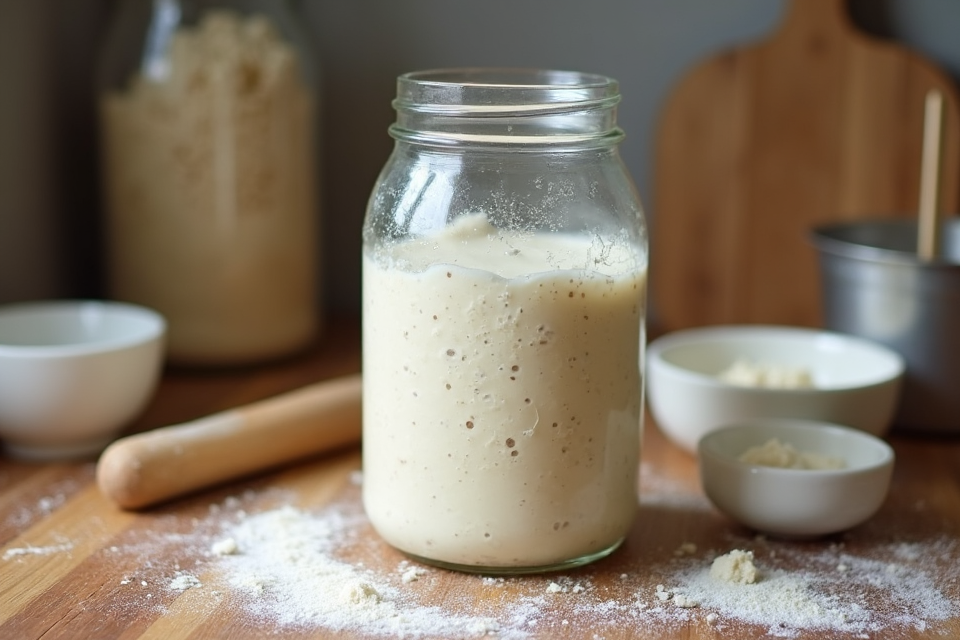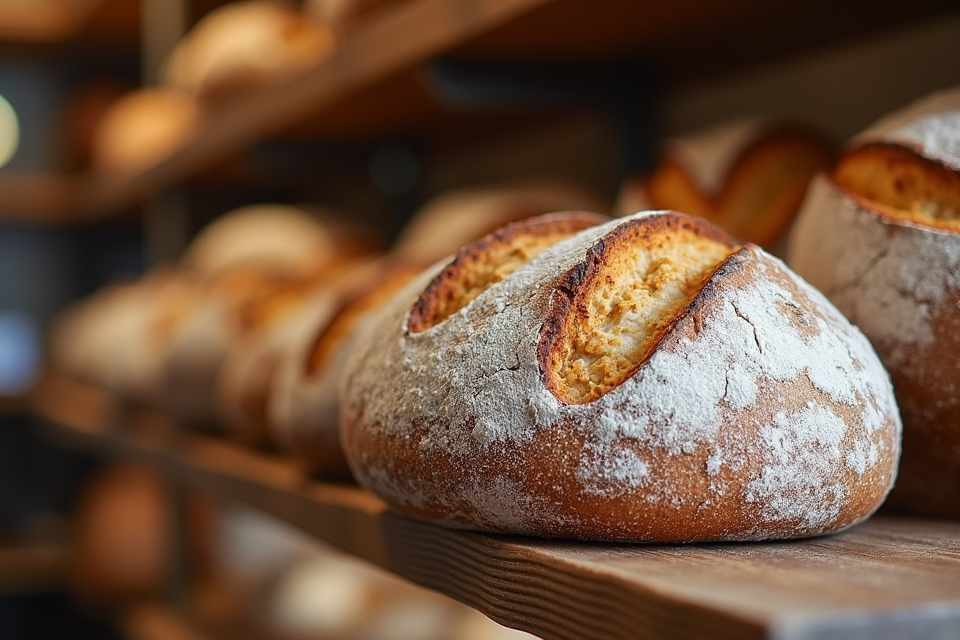Table of contents
- Introduction
- What Makes Sourdough Bread Unique?
- Nutritional Composition
- Role of Fermentation in Weight Management
- Lower Glycemic Impact
- Improved Digestibility
- Portion Control and Satiety
- Comparison with Other Bread Types
- Myths About Bread and Weight Gain
- Health Benefits of Sourdough Bread
- Tips for Choosing Healthy Sourdough Bread
- How to Incorporate Sourdough into a Healthy Diet
- FAQs
- Conclusion
Introduction
Sourdough bread has gained immense popularity in recent years, touted as a healthier alternative to traditional bread. But why is sourdough bread considered less fattening, and can it truly support your health goals? The secret lies in its unique fermentation process, which not only enhances its flavor but also improves its nutritional profile. In this article, we’ll delve into the science behind sourdough bread and why it may be less likely to contribute to weight gain compared to other bread types. Learn more about the versatility of sourdough in recipes like Sourdough Cinnamon Rolls: Easy, Fluffy, and Tangy.
What Makes Sourdough Bread Unique?
Sourdough bread stands out from other types of bread due to its distinct preparation method. Unlike commercial bread that relies on baker’s yeast for rising, sourdough uses a natural fermentation process involving a “starter” made of flour and water. This starter captures wild yeast and beneficial bacteria from the environment, which interact to ferment the dough over several hours or even days.
The Fermentation Process
The fermentation process not only gives sourdough its characteristic tangy flavor and chewy texture but also alters its nutritional profile. During fermentation, the microbes break down sugars and starches in the dough, reducing the bread’s overall carbohydrate content. Additionally, they produce organic acids, which contribute to its longer shelf life and unique taste.

Differences from Regular Bread
Traditional bread made with commercial yeast is typically faster to produce but lacks the complexity and health benefits of sourdough. Commercial bread often contains added sugars, preservatives, and stabilizers, which can contribute to higher calorie content and reduced digestibility. In contrast, Naturally leavened bread especially when made with whole-grain flour, is a more natural and wholesome option.
Nutritional Composition
Sourdough bread is celebrated for its balanced nutritional content, making it a suitable choice for those seeking healthier options without sacrificing taste.
Macronutrients
A standard slice of sourdough bread typically contains fewer calories than white or whole-wheat bread. On average, it has:
- Calories: 120-150 per slice (depending on size and ingredients)
- Protein: 4-5 grams
- Carbohydrates: 20-25 grams
- Fat: 0.5-1 gram
The fermentation process reduces the available starches in the bread, which can slightly lower the calorie density compared to other bread types.

Glycemic Index
Sourdough bread has a lower glycemic index (GI) than many other breads. The acids produced during fermentation slow the digestion and absorption of carbohydrates, leading to a more gradual rise in blood sugar levels. This characteristic makes sourdough a particularly appealing option for people looking to manage weight, diabetes, or energy levels.
Would you like me to continue with the next sections about the Role of Fermentation in Weight Management and the Lower Glycemic Impact?
Role of Fermentation in Weight Management
The fermentation process used to make Fermented loaf plays a pivotal role in its ability to support weight management. This unique preparation method impacts gut health, digestion, and the way your body absorbs nutrients.
Gut Health Benefits
Sourdough bread is rich in probiotics and prebiotics, thanks to the natural fermentation process. While the probiotics (live beneficial bacteria) may not survive the high temperatures of baking, the prebiotics remain intact. Prebiotics are non-digestible fibers that serve as food for the good bacteria in your gut, promoting a balanced microbiome. A healthy gut has been linked to improved metabolism, better digestion, and even reduced fat storage.
Enhanced Nutrient Absorption
Fermentation breaks down phytic acid, a natural compound found in grains that can inhibit the absorption of essential minerals like calcium, magnesium, and zinc. By reducing phytic acid levels, sourdough bread ensures that your body absorbs more nutrients from each slice, providing better nutritional value for the calories consumed.
Reduced Carbohydrate Impact
The microbes in sourdough consume sugars and starches during fermentation, which reduces the overall carbohydrate content of the bread. This process can make sourdough less calorie-dense than its commercial counterparts, contributing to its reputation as a weight-friendly option.
Lower Glycemic Impact
One of the standout qualities of sourdough bread is its lower glycemic impact, which helps regulate blood sugar levels and manage appetite.
Blood Sugar Regulation
When you consume foods with a high glycemic index, your blood sugar spikes quickly, leading to a subsequent crash that often triggers hunger and overeating. Sourdough bread, with its lower glycemic index, causes a slower and more stable rise in blood sugar. This steady energy release helps curb cravings and keeps you feeling satisfied for longer periods.
Improved Insulin Response
The organic acids produced during fermentation, such as lactic acid and acetic acid, play a critical role in slowing carbohydrate digestion. These acids not only lower the glycemic index of sourdough but also improve your body’s sensitivity to insulin. For individuals managing weight or diabetes, this improved insulin response can be particularly beneficial.
Improved Digestibility
the fermented dough is widely regarded as easier to digest than many other types of bread, even for individuals with mild sensitivities.
Prebiotics and Digestive Support
As mentioned earlier, the prebiotics in sourdough bread nourish your gut bacteria, supporting overall digestive health. A well-functioning digestive system can efficiently process food and avoid bloating or discomfort, common issues with some commercial breads.
Reduced Antinutrients
During fermentation, sourdough microbes break down antinutrients like phytic acid and gluten. This process makes the bread gentler on the stomach and more tolerable for people with gluten sensitivities. While sourdough bread is not gluten-free, its reduced gluten content may be less inflammatory for some individuals.
Potential Benefits for Weight Loss
Better digestion and nutrient absorption can contribute to weight loss efforts by ensuring that your body maximizes the value of the calories consumed. Additionally, sourdough’s ease of digestion may help reduce inflammation and water retention, both of which can impact body weight.
Would you like me to proceed with the next sections on Portion Control and Satiety and Comparison with Other Bread Types?
Portion Control and Satiety
One of the reasons sourdough bread is not considered fattening is its ability to promote satiety, or the feeling of fullness, after a meal. This characteristic can help control portion sizes and reduce overall calorie intake.
How Sourdough Enhances Fullness
Sourdough bread’s dense texture and natural fiber content contribute to its satisfying nature. When consumed, it takes longer to chew and digest, signaling your brain that you’ve had enough to eat. Additionally, the slow-release carbohydrates from sourdough provide sustained energy, reducing the likelihood of snacking between meals.
The Role of Organic Acids in Satiety
The lactic and acetic acids produced during fermentation play an important role in satiety. These acids slow the digestion of starches, leading to a gradual release of glucose into the bloodstream. As a result, you feel fuller for longer, reducing the urge to overeat.
Ideal Serving Sizes
While sourdough bread offers numerous benefits, portion control remains essential. A typical serving is one slice, which pairs well with nutrient-dense toppings like avocado, lean protein, or vegetables. By incorporating sourdough into balanced meals, you can enjoy its benefits without consuming excess calories, like as Sourdough Cinnamon Rolls: Easy, Fluffy, and Tangy:
Comparison with Other Bread Types
To understand why sourdough bread is less likely to contribute to weight gain, it’s helpful to compare it with other common bread types.
Sourdough vs. White Bread
White bread, made from refined flour, lacks the fiber and nutrients found in sourdough. It has a higher glycemic index, causing rapid blood sugar spikes and crashes that can lead to overeating. In contrast, sourdough’s fermentation process lowers its glycemic impact and enhances nutrient availability.
Sourdough vs. Whole-Grain Bread
Whole-grain bread is often praised for its fiber content and health benefits. While it is a healthy option, sourdough bread made from whole-grain flour combines the benefits of both worlds. The fermentation process in sourdough further reduces antinutrients and enhances digestibility, giving it an edge over standard whole-grain bread.
Sourdough vs. Multigrain Bread
Multigrain bread contains a mixture of grains but may not always be made with whole grains. Some varieties are loaded with added sugars and preservatives. Sourdough, on the other hand, is often simpler, with fewer additives, making it a more natural and wholesome choice.
Myths About Bread and Weight Gain
Bread has often been unfairly blamed for weight gain, leading many to avoid it altogether. However, not all bread is created equal, and sourdough offers a healthier perspective.
Myth: All Bread is High in Calories
While it’s true that bread can be calorie-dense, sourdough’s fermentation process reduces its carbohydrate content, making it less calorie-intensive than many other options. Moreover, when paired with the right foods, sourdough can be a valuable part of a balanced diet.
Myth: Bread Causes Belly Fat
Excess weight gain, including belly fat, is typically the result of consuming more calories than your body needs. Sourdough bread, with its nutrient density and ability to promote satiety, is less likely to lead to overeating compared to refined bread options.
Myth: Gluten-Free Bread is Always Better
For those without celiac disease or severe gluten sensitivity, sourdough bread can be easier to digest than many gluten-free breads. Gluten-free options often contain added starches and sugars to improve texture, which can make them less weight-friendly than naturally fermented sourdough.
Would you like me to continue with sections on Health Benefits of Sourdough Bread and Tips for Choosing Healthy Sourdough Bread?
Health Benefits of Sourdough Bread
Sourdough bread is celebrated not only for its role in weight management but also for its broader health benefits. Its natural fermentation process enhances the bread’s nutritional profile, offering advantages beyond simple calorie reduction.
Heart Health
Sourdough bread may contribute to cardiovascular health in several ways. The fermentation process increases the availability of bioactive compounds like polyphenols, which have antioxidant properties. These antioxidants help reduce inflammation and oxidative stress, both of which are linked to heart disease. Additionally, sourdough’s lower glycemic impact helps regulate blood sugar, indirectly supporting heart health by reducing the risk of diabetes—a major risk factor for heart problems.
Gut Health
The prebiotic fibers in sourdough bread promote a healthy gut microbiome by nourishing beneficial bacteria. A balanced gut microbiome is associated with improved digestion, better nutrient absorption, and even mental well-being. For individuals with mild digestive sensitivities, sourdough can be gentler on the stomach due to its reduced gluten content and breakdown of antinutrients.
Immune System Support
A healthy gut microbiome is closely linked to a robust immune system. By supporting gut health, sourdough bread indirectly helps bolster immunity. Additionally, the enhanced nutrient availability, such as magnesium and zinc, supports overall immune function.
Better Energy Levels
Sourdough’s slow-digesting carbohydrates provide a steady source of energy, preventing the energy crashes that often follow consumption of high-GI foods. This sustained energy release can improve focus, productivity, and overall physical performance.
Tips for Choosing Healthy Sourdough Bread
Not all sourdough bread is created equal, so it’s important to make informed choices when shopping or baking at home. Here are some tips to ensure you’re selecting the healthiest option.
Check the Ingredients
Authentic Wild yeast bread typically contains just three main ingredients: flour, water, and salt. Avoid brands that include added sugars, oils, or preservatives. Look for labels indicating that the bread is made with a natural starter rather than commercial yeast.
Opt for Whole-Grain Varieties
For added fiber and nutrients, choose sourdough bread made with whole-grain flour. Whole-grain sourdough retains more of the grain’s natural vitamins, minerals, and fibers, making it an even healthier choice.
Beware of Imitations
Some commercially produced sourdough breads are made with added souring agents to mimic the tangy flavor of authentic sourdough. These breads lack the fermentation benefits and may include unnecessary additives. Look for bakery or artisan sourdough for a more genuine product.
Try Homemade Sourdough
If you want full control over the ingredients and fermentation process, consider making sourdough bread at home. Homemade sourdough allows you to customize the recipe to your taste and dietary needs, ensuring maximum health benefits.

How to Incorporate Sourdough into a Healthy Diet
Sourdough bread can be a versatile and nutritious addition to your meals. Here are some practical tips for incorporating it into your diet without compromising your health goals.
Pair with Nutrient-Dense Foods
Sourdough bread pairs well with a variety of healthy toppings. Consider using it as a base for:
- Avocado toast with seeds and a drizzle of olive oil
- Open-faced sandwiches with lean protein and vegetables
- Nut butter and sliced bananas for a balanced snack
Watch Your Portions
While sourdough is a healthier bread choice, portion control is key to preventing excessive calorie consumption. Stick to one or two slices per meal and complement it with proteins, healthy fats, and vegetables.
Use in Creative Recipes
Sourdough can be used in recipes beyond toast and sandwiches. It works well in:
- Panzanella salad
- Stuffing for poultry or vegetables
- Bread pudding made with minimal sugar
- Grilled croutons for soups and salads
Plan for Balanced Meals
When eating sourdough bread, consider the overall balance of your meal. Combine it with foods that are high in protein and fiber to enhance satiety and reduce the likelihood of overeating later.

FAQs
Is sourdough bread gluten-free?
No, sourdough bread is not gluten-free. However, its fermentation process breaks down some of the gluten, making it easier to digest for people with mild gluten sensitivities. It is not suitable for individuals with celiac disease.
Can sourdough bread help with weight loss?
Yes, sourdough bread can support weight loss when consumed in moderation as part of a balanced diet. Its ability to promote satiety and regulate blood sugar levels makes it a weight-friendly option compared to refined bread.
Is store-bought sourdough as healthy as homemade?
Not always. Many store-bought sourdough breads contain additives and are not made with a natural starter. Homemade or bakery sourdough is often a healthier choice.
How does sourdough compare to keto bread?
Keto bread is designed to be low in carbohydrates, making it suitable for ketogenic diets. Sourdough is not low-carb but offers other health benefits like improved digestibility and nutrient availability, This challenge is explained in Why Are My Sourdough Cinnamon Rolls Not Fluffy?.
Can sourdough bread upset my stomach?
For most people, sourdough bread is easier to digest than commercial bread. However, individuals with specific sensitivities to wheat or gluten should consume it cautiously.
How can I tell if sourdough is authentic?
Authentic sourdough will have a short ingredient list, a tangy aroma, and a dense texture. Check for labels indicating a natural starter and avoid brands with added yeast.
Conclusion
Sourdough bread stands out as a healthier alternative to traditional bread, thanks to its natural fermentation process. Its benefits include a lower glycemic index, enhanced digestibility, and the ability to promote satiety. By choosing authentic sourdough and incorporating it into a balanced diet, you can enjoy its rich flavor and health advantages without worrying about weight gain. Whether you purchase it from a trusted bakery or bake it at home, sourdough bread offers a delicious way to support your health and wellness goals.

